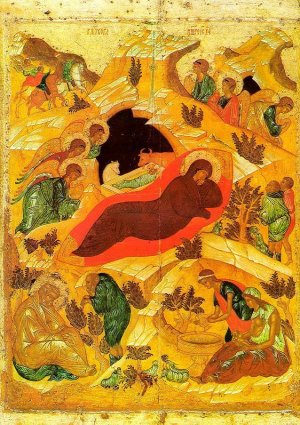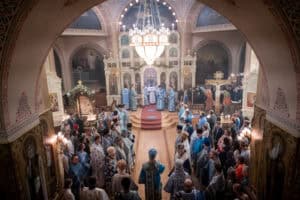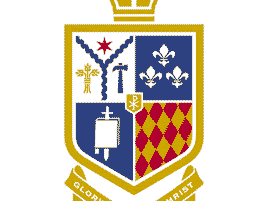2015 NATIVITY MESSAGE OF HIS GRACE, BISHOP PAUL
Beloved Clergy, Monastics, and Faithful of the Diocese of the Midwest:
Christ is Born — Glorify Him!
Recently, I have been thinking about how there is so much happening in the Middle East that has impacted the lives of the region’s Orthodox Christians. We have heard reports of bishops kidnapped (and maybe slain), Coptic Christians martyred in Egypt, and Christians fleeing Iraq and, most recently, Syria. Various Orthodox Churches and other groups have made efforts to contact governments to call attention to the fact that a form of genocide against Christians is occurring in the Middle East. This is a difficult time for Christians there. Many of our churches are offering regular and necessary prayers for those who are suffering and being persecuted for their faith.
 The current situation could be interpreted as very discouraging. The public media does not consider such things to be newsworthy enough to report. One might question whether Christianity is in trouble (and whether it will survive) in the region. Something needs to be done to end this genocide by government intervention to protect those being persecuted merely because of their faith in Christ. There is much about the above thought I share. But I do ask the question, is Christianity in trouble? Is it in danger of becoming extinct? I don’t believe so.
The current situation could be interpreted as very discouraging. The public media does not consider such things to be newsworthy enough to report. One might question whether Christianity is in trouble (and whether it will survive) in the region. Something needs to be done to end this genocide by government intervention to protect those being persecuted merely because of their faith in Christ. There is much about the above thought I share. But I do ask the question, is Christianity in trouble? Is it in danger of becoming extinct? I don’t believe so.
As I reflect upon this in light of our approaching celebration of the Lord’s Nativity, I offer the following thoughts.
-
Our faith is based on a revelation that is not fulfilled and realized in our lives by “trusting in princes and sons of men, in whom there is no salvation.” What the Church needs today — in our country and abroad — are faithful people to bear witness to the reality that the Son of God becomes the Son of Man, so that by Grace we can become all that God is by nature.
“And war broke out in heaven: Michael and his angels fought with the dragon; and the dragon and his angels fought, but they did not prevail, nor was a place found for them in heaven any longer. So the great dragon was cast out, that serpent of old, called the Devil and Satan, who deceives the whole world; he was cast to the earth, and his angels were cast out with him. Then I heard a loud voice saying in heaven, ‘Now salvation, and strength, and the kingdom of our God, and the power of His Christ have come, for the accuser of our brethren, who accused them before our God day and night, has been cast down. And they overcame him by the blood of the Lamb and by the word of their testimony, and they did not love their lives to the death. Therefore rejoice, O heavens, and you who dwell in them! Woe to the inhabitants of the earth and the sea! For the devil has come down to you, having great wrath, because he knows that he has a short time.’” (Revelation 12:7-12)
The way we overcome evil in the world is by remaining faithful to Christ and His message to “repent, for the Kingdom of Heaven is at hand.” When Peter confessed Jesus to be “the Christ, the Son of the Living God,” Jesus said He would build His Church on the rock of Peter’s confession of faith, adding that “the gates of Hell would not prevail against it.” The above quote from Revelation is meant to encourage, rather than discourage, us. It also explains why we may be encountering what we encounter today. Our own history tells us that whenever the Church is in danger of being extinguished, it is always the faithful martyrs who guarantee its ongoing life. Tertullian is known for the famous quote, “the blood of the martyrs is the seed of the Church.”
- Finally, there is something very unique about the Christian Gospel: it is transformative in nature. Christ as man meets us fallen human beings in this world to bring us into His kingdom, which is not of this world. He identifies totally with our fallen condition, even to the point of becoming a curse for us on the Cross — such that an instrument of death and scandal becomes an instrument of life and glory for us. The uncontainable, incomprehensible, invisible God is revealed to us as the Father, through the Incarnation of the Word. Saint Athanasius makes this clear in this treatise On the Incarnation when he writes,
“…through the Incarnation of the Word the Mind whence all things proceed has been declared, and its Agent and Ordainer, the Word of God Himself. He, indeed, assumed humanity that we might become God. He manifested Himself by means of a body in order that we might perceive the Mind of the unseen Father. He endured shame from men that we might inherit immortality. He Himself was unhurt by this, for He is impassable and incorruptible; but by His own impassibility He kept and healed the suffering men on whose account He thus endured. In short, such and so many are the Savior’s achievements that follow from His Incarnation, that to try to number them is like gazing at the open sea and trying to count the waves.” (Chapter 54)
Our Lord said, “He who has seen Me has seen the Father” (John 14:9). This sums up the significance of the Incarnation. This revealed truth cannot be taken away from us as we embrace it, believe it, and live by it. We will move mountains by it, bring good news to people by it, bring peace and reconciliation to the world by it, and even be able to forgive those who would seek to harm us by it. I cannot think of a better weapon than this message of peace that reveals the invisible God in the self-emptying love of our Lord God and Savior, Jesus Christ.
“For you know the grace of our Lord Jesus Christ, that though He was rich, yet for your sakes He became poor, that you through His poverty might become rich.” (2 Corinthians 8:9)
With Love in Christ,
+Paul
Bishop of Chicago and the Midwest
To be read during Nativity services and/or circulated among the faithful of the Diocese.




